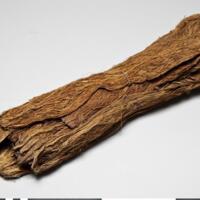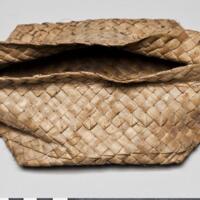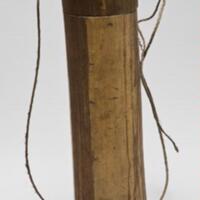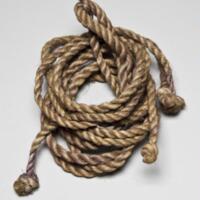Rattan Rope
Text
Rope of rattan (V.66.35)
Share this
Media
Images
Map Museum of Ethnography Stockholm
Metadata
Date
1884
Type
Physical Object
Identifier
1887.08.3742
Origin
Tagalog Origin: Luzon, Cabcaben
Materials
plant materials, cane
Physical Dimensions
Length: 40 cm (dimension rolled) | Width: 37 cm (dimension rolled)
Provenance
Time - field acquisition
1884-11
Name - acquired from
Stolpe, Hjalmar (1841 - 1905), archaeologist, ethnographer, curator who participated as an ethnographer in the frigate Vanadi's world voyage 1883-85, from where he brought home 7,500 objects. / US
Acquisition circumstances - in the field
Purchased in the Tagal village Cabcaben at N.V. side of Manila Bay, Luzon
1884-11
Name - acquired from
Stolpe, Hjalmar (1841 - 1905), archaeologist, ethnographer, curator who participated as an ethnographer in the frigate Vanadi's world voyage 1883-85, from where he brought home 7,500 objects. / US
Acquisition circumstances - in the field
Purchased in the Tagal village Cabcaben at N.V. side of Manila Bay, Luzon
Acquisition Date
1887
Short description
From the catalog (OCR)
http://collections.smvk.se/carlotta-em/web/object/1625412
http://collections.smvk.se/carlotta-em/web/object/1625412
Related Object
Similar objects in this collection:
http://collections.smvk.se/carlotta-em/web/object/1625412
http://collections.smvk.se/carlotta-em/web/object/1625412
Display status
Not on display
References
http://collections.smvk.se/carlotta-em/web/object/1003860, http://collections.smvk.se/carlotta-em/web/object/1001137, http://kulturarvsdata.se/LSH/events/3554, http://kulturnav.org/ad0e10b7-dea6-4ef9-942d-6c04899ed8c4
Official Website
Collection
Source
Translated from Swedish by Google Translate
Record accessed Dec. 2020
Edited for grammar by the Mapping team
Record accessed Dec. 2020
Edited for grammar by the Mapping team
Cite this Page
“Rattan Rope,” Mapping Philippine Material Culture, accessed April 23, 2024, https://philippinestudies.uk/mapping/items/show/3223.
Geolocation
Sensitive Content
Mapping Philippine Material Culture collates digital material from institutions, and some of this material is inherently colonial and contains words, terms and phrases that are inaccurate, derogatory and harmful towards Filipino and Filipino diasporic communities. Catalogue transcriptions, book titles, exhibition titles and museum titles may contain harmful terms. We recognise the potential for the material to cause physical and mental distress as well as evoke strong emotions. Owing to the scale of the collection’s data, a process to implement sensitive-content warnings in the displayed data is still incomplete. The material within the catalogue does not represent Mapping Philippine Material Culture’s views. Mapping Philippine Material Culture maintains a strong anti-colonial, anti-racist position and affirms its support for centring the humanity of historically marginalised and disenfranchised communities.
Facebook Twitter



